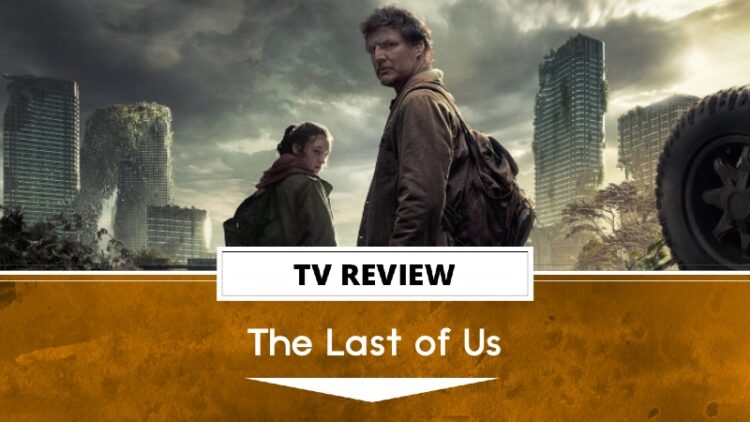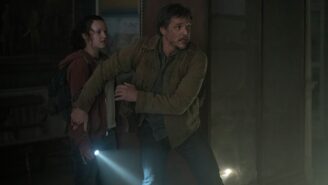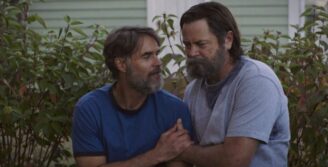If there’s one thing The Last of Us does, it makes the case that video games can have powerful narratives. Players of the hit 2013 game likely know this, and now folks experiencing the journey of Joel and Ellie 10 years later can learn this too. The HBO adaptation stays surprisingly faithful to the source material. Neil Druckmann, a creator of the original game, returns to write, joined by Chernobyl‘s Craig Mazin. Most of the changes come as additions, fleshing out the post-apocalyptic world of The Last of Us. Fans of the game should love the recreations of scenes and additional lore, while newcomers should enjoy getting to experience a televised version of one of the greatest video game stories of all time.
Both the game and the show occur in a post-apocalyptic America, ravaged by a bad fungal infection. And this fungal infection is bad, alright, turning much of the population into zombie-like fungal freaks. Joel, a disillusioned smuggler, gets hired to guide Ellie, a girl with immunity from the infection, on a cross-country journey to get her to the people who can potentially find a cure. Along the way, they cross paths with various characters and factions, some helpful, most not. It’s a bleak show, but it has glimmers of hope.
Well, Ellie, I guess we really are… The Last of Us
Taking on the role of Joel, Pedro Pascal has big shoes to fill. Joel goes from a caring dad to a broken man in the span of the first episode alone. Throughout his journey, he gradually learns to put his faith in other people again. Pascal is no stranger to playing an introspective hero guiding a child on a mission, evidenced by his title role in The Mandalorian. But here, we see him come out from behind a mask. Pascal shows us a man at his highest of highs and lowest of lows. His emotional range runs the gamut and does much heavy lifting against the sometimes sparse script.
Supporting Joel is Bella Ramsey as Ellie. I have to admit, while Pascal sold me from the first episode, Ramsey took time to grow on me. Like Joel, Ellie is complex–both moody and hilarious. Ramsey conveys the moody moments well, as Ellie also knows loss and mistrusts others. But it isn’t until the fourth episode that she starts to become comfortable with the lighter side of the character. Unlike Pascal, Ramsey doesn’t always find her footing in the role, but during the more intense scenes, she nails the pain and rage of the character when it counts most.
A wealth of strong supporting actors round out the cast, playing characters that are a mix of conniving, mistrusting, and scared–as well as their occasionally fungal-infected counterparts. Merle Dandridge returns as Marlene, the leader of the secret group The Fireflies, and the only actor reprising their role from the game. Troy Baker and Ashley Johnson, the original Joel and Ellie, appear in minor yet impactful roles. Lamar Johnson gives an emotionally brutal performance as Henry, with Keivonn Woodard conveying the hope and confusion of a child in the apocalypse as his brother Sam–reimagined as deaf in the show, to highlight the bond the two share.
And two of the best performances come courtesy of a surprising turn from Nick Offerman and Murray Bartlett as Bill and Frank. Their episode marks a significant departure from the game, as the show reveals the backstory of how the couple met and thrived in the post-apocalypse. It’s a great example of how a change works for the better. The one-off episode conveys how society deteriorated from when it collapsed to the present, fleshes out the history of characters from the game, and offers the most hopeful yet bittersweet episode of the series. It makes the case for the adaptation as “not just another zombie show” and as a way for the game’s fans to learn more about the world of The Last of Us. Other additions that serve these purposes include pre-apocalypse flashbacks of scientists, experts, and governments attempting to mitigate the disaster–evoking the crisis control from Chernobyl, showcasing Mazin’s touch.
That said, not every change or addition works. Much narrative dissonance comes from the show attempting to morph the game’s raiders into semi-legitimate communities. This choice erases the appearance of actual plundering bands of raiders, making them even less scarce than the rarely-seen infected. Characters will mention a fear of raiders, but we never see them. Instead, “raiders” will randomly attack our protagonists and then establish they never attack anyone unprovoked, actually, after returning to their “peaceful homes.” How do the game’s NPCs feel more realistic than these goons?
This foible sounds like a relatively minor complaint, and it is, but the focus on these various communities and their in-house squabbles also takes time away from Joel and Ellie’s trek. In a nine-episode season, time matters. And the focus-pull away from Joel and Ellie dulls the impact of the momentous ending. Yes, the show alters some details to make the ending still feel impactful, but it doesn’t land as powerfully as the game’s. It’s a testament to the acting of Pascal and Ramsey that in the last couple of episodes, they do a ton of heavy lifting to fast-track the bond between Joel and Ellie.
As such, The Last of Us serves as a case study of how some narratives are simply better suited to the medium of games. But at the same time, it’s an achievement in how to adapt a gaming story to filmed media. For the most part, the writing of Druckmann and Mazin instills changes that fulfill the emotional and thematic purposes that gameplay previously conveyed, supported by the committed acting of the cast. The Last of Us works as both a uniquely successful game adaptation and a breath of fresh fungal life into the zombie and apocalypse genres.
The Last of Us
Summary
The Last of Us proves that video game stories can successfully jump to TV and film, albeit with a few necessary changes. Not every change works, but the performances of Pedro Pascal, Bella Ramsey, and the supporting cast fill in most of the narrative gaps. The show has roped in fans of the game and those who don’t even play games. Its world-building and moral quandaries support a show worth watching–so don’t get left behind.
Pros
- A faithful adaptation that builds upon the world of The Last of Us games.
- Flashbacks that contextualize this version of the apocalypse.
- Solid acting across the board, especially Nick Offerman (who wasn’t even the first choice for Bill!)
- The production design gives the world a real lived-in (and left to rot) feel to it.
Cons
- Narrative dissonance when giving the raiders backstories.
- Not enough time spent on Joel and Ellie.
-
The Last of Us





